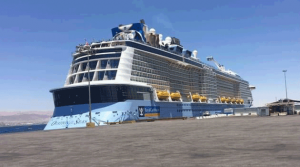As visitor numbers soar Aqaba expects New Year tourism boost

Aqaba received 1.9 million tourists and visitors during the first 11 months of 2022, according to the Commissioner for Tourism and Environment in the Aqaba Special Economic Zone Authority (ASEZA) Nidal Majali.
He noted that this marks a 138.8 per cent increase from last year, during which 793,000 tourists and visitors entered Aqaba, through various border crossings.
The year 2022 also recorded around 930,000 bookings in Aqaba’s hotels and around 300,000 bookings in Wadi Rum, marking a 48 per cent and a 212.7 per cent increase respectively, compared with 2021, Majali said.
He also noted that King Hussein International airport recorded 3,226 aircraft movements, marking a roughly 125 per cent increase from 2021.
“These numbers are indicative of an excellent growth in the tourism sector,” he told The Jordan Times.
Both cruise ships and low-cost carries continue to arrive non-stop at the Aqaba port and King Hussein International Airport, according to Majali.
ADVERTISEMENT
Last week, Aqaba received three cruise ships and one more is expected to arrive on Sunday, carrying around 1,600 tourists, he said.
“However, hotels’ occupancy rates are somewhat humble during this time of the year, which coincides with the Christmas and holiday season as people prefer to spend it at home with their families,” he added.
Moreover, Majali said that the beginning of the new year is expected to witness a 51 per cent increase in hotels’ occupancy rates in Aqaba.
Up until today, 96 cruise ships confirmed their arrival in Aqaba’s port in 2023, marking a 25 per cent increase compared with 2022, which received 74 cruise ships so far, he added.
“This is a sign of a very promising recovery for the tourism sector, which was hit the hardest by the COVID-19 pandemic,” Mohammad Al Basheer, an economist, told The Jordan Times.
He pointed out the importance of tourism, considering that it has a multiplier effect across various economic sectors, such as transport and food service, and it’s a generator of both employment and income.
“Tourism also has the potential to bridge cultural gaps and introduce people from different countries around the world to Jordan’s cultural and historical heritage,” he said.
Basheer also stressed the importance of promoting responsible tourism and preserving Jordan’s various tourist attractions, especially archaeological sites.
Moreover, he said that involving local communities is an essential component in ensuring the sustainability and development of the tourism sector.
“It’s important to cooperate with members of the local community and ensure that they are benefiting from the tourism activity, which requires providing both educational and occupational training programmes,” he added.
Wajdi Makhamreh, also an economist, said that tourism is “Jordan’s oil”, as it contributes to a large percentage of its gross domestic product (GDP).
“It is an important driver of the Kingdom’s national economy and it involves many promising niches to be invested in,” he told The Jordan Times, stressing the importance public-private partnerships and collaborations.
Makhamreh added that an optimal utilisation of Jordan’s tourist attractions requires investing in the sector’s “complementary industries”, which include hotels, transport services and entertainment.
Source: Jordan Times

